The views expressed in our content reflect individual perspectives and do not represent the authoritative views of the Baha'i Faith.
We’ve now entered the era of fake news and “alternative facts”—euphemisms for lies, propaganda, hidden agendas and misinformation, or worse, intentional disinformation.
I am not speaking of sometimes mixing up facts or making an honest mistake, but rather, the deliberate attempt to sway audiences with one’s own version of truth as one wants to show it, rather than clearly stating what the truth is for truth’s sake. All the people everywhere, in order to make effective decisions, need honest reporting, serious investigative journalism, and access to real facts to demonstrate the truth.
Luckily for many who test the veracity of the news, some third-party debunkers exist, like Snopes, Urban Legends and the US Department of Energy site Hoaxbusters, which all try to debunk common lies and urban folklore not grounded in reality. Another site, Politifact, checks statements by politicians and awards a “Pants on Fire” label to those claims that are at odds with facts or history.
Regardless of ideology, a free press is one thing everyone can readily admire and promote, as well as protect. As citizens of our countries, we have an obligation to nurture a free and objective media environment with our business when we find sources we admire and trust.
But we live in an age where anyone with access to a phone or a computer and the internet, can issue their own ‘news.’ Yet we’ve been warned since we were children, “Don’t always trust what you read.” But we tend to anyway. Therefore, we live in an age when we must try to test the veracity of the news by examining its source (Is it trustworthy?), examining its bias (Is there a slant or hidden agenda here?), and by examining the logic and rationality of the news items themselves (Does this ring true? How can I test it?).
We know, throughout human history, that some news sources can be wrong, or even intentionally misleading. The Nobel Prizes are a direct result of the mistaken publication of Alfred Nobel’s obituary in 1888, instead of his brother Ludwig. With millions of media outlets, it pays to be vigilant about what we choose to believe.
Therefore, we must create and consume news with a singular purpose: to arrive at the truth.
In his book The Secret of Divine Civilization, Abdu’l-Baha offers insight as to the indispensability of the press in future society. He says it is:
It is therefore urgent that beneficial articles and books be written, clearly and definitely establishing what the present-day requirements of the people are, and what will conduce to the happiness and advancement of society. These should be published and spread throughout the nation, so that at least the leaders among the people should become, to some degree, awakened, and arise to exert themselves along those lines which will lead to their abiding honor. The publication of high thoughts is the dynamic power in the arteries of life; it is the very soul of the world. – p. 109.
Abdu’l-Baha also wrote:
Public opinion must be directed toward whatever is worthy of this day, and this is impossible except through the use of adequate arguments and the adducing of clear, comprehensive and conclusive proofs. – Ibid.
As to manner and style, Baha’u’llah said “Whatever is written should not transgress the bounds of tact and wisdom,” and he exhorted authors to “write in such a way as would be acceptable to fair-minded souls …” He also issued a valuable reminder:
We have said in the past that one word hath the influence of spring and causeth hearts to become fresh and verdant, while another is like unto blight which causeth the blossoms and flowers to wither. – Tablets of Baha’u’llah, p. 141.
Baha’is believe that one of the new tools revealed by Baha’u’llah—the Baha’i process of consultation—can help the news media preserve “the rights of the people:”
In light of all this, the code of conduct of the press must embrace the principles and objectives of consultation as revealed by Baha’u’llah. Only in this way will the press be able to make its full contribution to the preservation of the rights of the people and become a powerful instrument in the consultative processes of society, and hence for the unity of the human race. – The Universal House of Justice, 29 December 1988, To the Followers of Baha’u’llah in America.
We know the power of words is astonishing, and we know that the news media has a pathway to our doorstep, to our computers and to our phones with its reporting. Living in a world without the news is not a viable option. We can’t close ourselves off from it. We must make it better. We must support a free press that tells the truth.
To explore how, we’ll look at the Baha’i practice of consultation in the final essay of this series, and see how it can inform and reform journalism.
















Comments
Sign in or create an account
Continue with Googleor